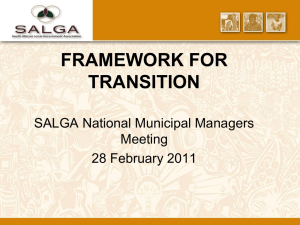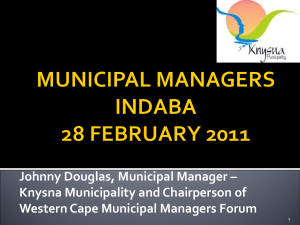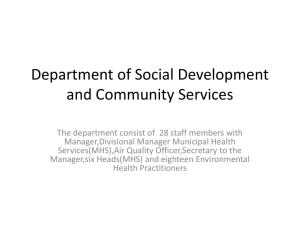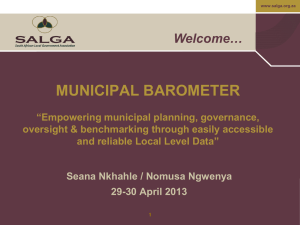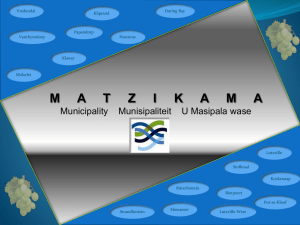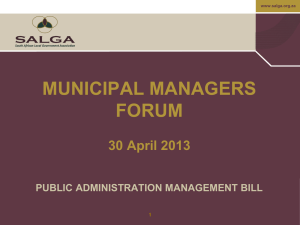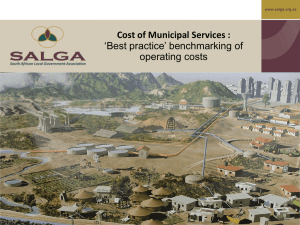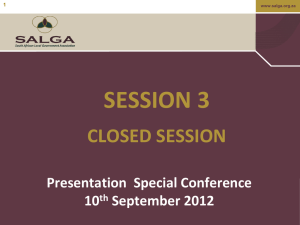Public Administration Management Bill
advertisement
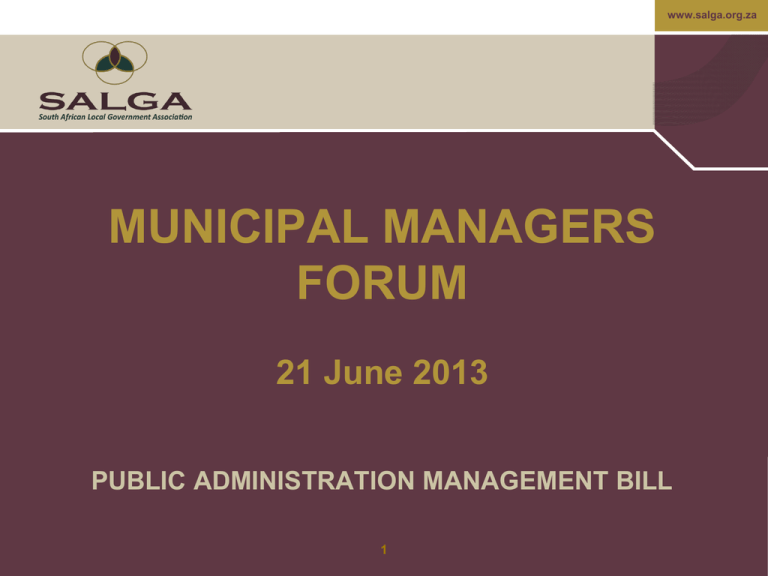
www.salga.org.za MUNICIPAL MANAGERS FORUM 21 June 2013 PUBLIC ADMINISTRATION MANAGEMENT BILL 1 www.salga.org.za OUTLINE OF PRESENTATION General Comments – The Constitutionality of the Bill Definition clauses and application of the Bill Section 1 – Definitions Section 2 – Applications and conflicts Section 4 – The service charter Section 5 – Service Centres Section 8 – The establishment of government components Section 9 – Transfer of functions Section 12 and 13 – Senior Management service and appointment of SMS Section 14 and 15 – Terms and conditions of SMS Section 18 – Employment Section 24 and 25 Transfer and secondment of staff Section 29 and 30 – Collective Bargaining and removal of disparities 2 www.salga.org.za OUTLINE OF PRESENTATION Section 32 and 33 – School of Public Administration and Management and compulsory training Section 35 and 40 Conditions of Service Section 45 – Anti-corruption Bureau Legislative amendments Conclusion 3 www.salga.org.za The Constitutionality of the Bill • Section 195 (5) of the Constitution provides that national legislation regulating public administration may differentiate between different sector, administrations and institutions • Section 195(6) provides that the nature and functions of different sectors, administrations or institutions of public administration are relevant factors to be taken into account in legislation regulating public administration. • Section 151 provides that national and provincial government may not compromise or impede a municipality’s ability or rights to exercise its powers or perform its functions. • The Bill does not allow for this differentiation, and in particular does not allow for differentiation in terms of the objects of local government. 4 www.salga.org.za The Constitutionality of the Bill • The objects of local government as set out in the Constitution are as follows: To provide democratic and accountable government for local communities; To ensure the provisions of services to communities in a sustainable manner; To promote social and economic development; To promote a safe and healthy environment; To encourage the involvement of communities and community organisations in the matters of local government. • It proceeds to provide that a municipality must within its financial and administrative capacity strive to achieve the above-mentioned objects. • The object of the Bill contained in section 3 is stated as being the following: To ensure efficient, quality, collaborative and accountable service delivery by all institutions to alleviate poverty and promote social and economic development by inter alia removing and preventing unjustifiable disparities in conditions of service of employees in institutions across the three spheres of government • • The Bill does not contain a single section addressing either the alleviation of poverty of the promotions of social and economic development 5 The object of the Bill does not take into account the Constitutional role of local government. www.salga.org.za The Constitutionality of the Bill • Section 153 provides that a municipality must structure and manage its administration and budgeting and planning processes to give priority to the basic needs of the community. • Section 160 of the Constitution provides that a municipality makes decisions concerning the exercise of all the powers and the performance of all the functions of the municipality and may employ personnel that are necessary for the effective performance of its functions. • By requiring a municipality to consult the provincial executive when it wishes to establish a department or unit in the municipality clearly infringes on the rights of a municipality set out above. • The opinion is held that the Public Administration Bill is unconstitutional in that it impairs the Constitutional right of municipalities to arrange its own internal affairs and also impairs its ability to employ personnel and to effectively manage its administration and perform its functions as it needs to consult provincial government on the structuring of its administration 6 www.salga.org.za Section 1 – Definitions • The Bill purports to provide for a single administration, but State Owned Entities and municipal entities are not covered by the Bill. This defeats the object of removing disparities in conditions of service across all spheres of government. • The executive authority of a municipality is stated to be the municipal council, and while the role of the President and Premier is recognized in the Bill, the role of the executive on municipal level is not recognized. • The definition of government component includes a municipal component, but the definition is not clear and needs to be improved. • The definition clause only provides for permanent and temporary positions, not fixed terms contracts, except for heads of institutions, yet the SMS contemplated can be appointed permanently or for a fixed term. 7 www.salga.org.za Section 2 – Application and conflicts • The Bill provides that where framework developed in terms of the Bill and a provision of the Systems Act is in conflict with a determination in or in terms of such a framework, the content of the framework will prevail. • Such a provision and concept is foreign to the hierarchy of legislation, as subordinate legislation cannot amend or over-ride national legislation and will thus be invalid. 8 www.salga.org.za Section 4 – The Service Charter The Bill requires a service charter to be established by the Municipal Manager to be included in the IDP, and amends the Systems Act accordingly. The Municipal Manager cannot on own accord develop a part of the IDP as it is a document approved by the municipal council. In addition, the IDP in particular determines the plans and priority areas to ensure effective and efficient service delivery, which informs the budget. The inclusion of this section reflects that the drafters of the legislation do not have a full understanding of local government and its internal processes. 9 www.salga.org.za Section 5 – Service Centres • The Bill requires the establishment of service centres and sites for the delivery of services across spheres of government. • COGTA MinMEC is required to coordinate, monitor and support municipalities to implement protocols for the establishment of the service centres. • The areas of concern in this regard are twofold: 1.How will COGTA MinMEC be able to monitor and support these centres as it has no jurisdiction over provincial and national sector departments? 2.What will the impact of this be on local government- will it create a second generation of Thusong Centres where local government must carry the cost for national service delivery? 10 www.salga.org.za Section 8 – Establishment of Government components In order to establish a department in a municipality, the following requirements must be met: • Feasibility study required to establish or abolish; • Municipality may only establish or abolish a component after consultation with MEC for LG and Finance; • For each component, council must issue directive that list all legislative provisions that confer powers and impose duties on the head of the institution and list the powers delegated. This impairs the Constitutional authority of a municipality to arrange it own internal affairs (section 153) but is also in contradictions with the Systems Act as far as it related to the requirement for the terms of reference and system of delegations of a municipality. 11 www.salga.org.za Section 9 – Transfer of Functions Section 9 only speaks to National and Provincial Government and excludes Local Government. The objective and can therefore only be applicable to National and Provincial Government. If Local Government is to be included in the section, it should be set out in clear terms. The opinion is however held that assignment to local government should remain to be done in terms of the provisions of the Systems Act . 12 www.salga.org.za Section 12 & 13 – SMS Appointments The definition senior management service is unclear Heads are appointed for a period not exceeding 5 years, which period may not exceed 6 months after elections. This is in conflict with the Systems Act In this regard the Bill does not appear to set a general standard but on the contrary set standard only applicable in Local Government. The Bill also provides that the SMS may be appointed permanently or for such period of time as the council may approve Remuneration and bonuses of heads on national and provincial level dealt with, but the Bill is silent on the position in municipalities. The provision discriminates against local government as there is no parity in the determination of salary and bonuses of heads on municipal level 13 www.salga.org.za Section 14 & 15 Terms and conditions of SMS • The President may appoint head at municipal level to act in national provincial or other municipal institution. • The Bill also infringe on the right of a municipality as employer as the President may take decisions on the redeployment of municipal officials, without providing for the President to consult or interact with the employer municipality. • Minister of DPSA after consultation with Minister of Finance, determine framework for minimum and maximum remuneration and benefits of the SMS. The Minister must consult Minister responsible for Local Government and act in concurrence with Organised Local Government, if there is no concurrence within 60 days, Minister may proceed. 14 www.salga.org.za SMS members may be employed permanently, temporary, full time or part time posts additional to the staff complement All appointments are to be made in accordance with the Systems Act, while section 56 is being deleted Section 18 also contradicts the Municipal Systems Act in that it provides that employees can be appointed in addition to establishment. 15 www.salga.org.za Section 24 & 25 – Transfer and secondment of staff Employees may be transferred to another institution, if the employee requests or gives consent or without consent where the transfer is fair. Thus there is no regard to the rights of the employee. In case of a transfer the transferring and recipient institutions will agree on conditions of service, with no reference being made to any input by the affected employee or his /or her trade union. Similar provisions apply for secondment. The recipient institution bears cost of secondment, but no indication is given on whether a recipient institution will be consulted prior to a transfer or secondment. Appeals to the Labour Court on transfers and secondments does not suspend any decision in this regard, thus seriously affecting the labour rights of affected staff members. In addition the Bill does not suggest or provide for how implementation complexities that relates from a transfer from one employer to another will be managed. The Bill doesn’t deal with the process of consultation in the case of transfers and secondments, which contradicts the principles of S23 of fair labour practises as contained in the Bill of rights. 16 www.salga.org.za Section 29 & 30 Collective Bargaining If Collective bargaining refers to employees per the definition of employees. Then it will includes the Senior Management Service. If a collective agreement is not reached between the employer body and the trade unions, the Minister may make a determination provided negotiating procedures have been exhausted and Organised Local Government consents. This is contrary to section 23(5) of the Constitution as alluded to above. A trade union may still strike on a determination made by Minister, but no further right of recourse is allowed for the employer body. This in itself prejudices the employer body and is unfair. Organised Local Government is obliged to introduce terms and conditions in the Bargaining Council if requested by the Minister. It does not provide Organised Local Government with any option or input on the applicability thereof or not. This will compromise the position of the employer body. The framework for consultation should be determined, in particular who all the consultation, such as with National Treasury, will take place. The Bill does not take into account the requirement of the Systems Act. 17 www.salga.org.za Section 32 & 33 - School of Public Administration and Management and compulsory training • A school of public administration and leadership will be established that will provide training and issue diplomas and certificates. • The Minister may require that successful completion of specified education, training and tests are prerequisites for specific positions. In determining these, the Minister must act in consultation with Organised Local Government. • The relation between these requirements and the National Treasury Minimum Competency requirements are not alluded to but should be addressed. 18 www.salga.org.za Conditions of Services Section 35 of the Bill also contains prohibitions on doing business with the state as is already the case for municipal employees Despite provisions of Systems Act, section 37 provides that an employee who is nominated as candidate for election has his/her employment terminated upon certificate of nominations being issued by IEC. Despite the Bill stating that it only provides for frameworks, it deals in detail with abscondment, and internal appeals post disciplinary processes following abscondment. Section 40 provides that when applying for another position, an applicant must declare any prior action taken against him or her including pending or incomplete matters. If appointed in the position applied for, the previous employer may insist that the current employer complete any investigation and hearing and impose appropriate sanctions. The opinion is held that this will unduly prejudice both the employer and employee. The Bill imposes the internal remedies, including the grievance procedure of the Public Service Commission on all employees, thus again imposing on the collective 19 bargaining process. www.salga.org.za Section 45 – Anti-Corruption Bureau The Bill establishes an Anti-Corruption Bureau The head of an institution may request the Bureau to investigate or institute disciplinary proceedings in cases of corruption related misconduct. This will include the appointment of presiding officers and employer representatives. The Process contemplated is completely different to the Disciplinary Regulations for Senior Managers or the collective agreement on discipline. 20 www.salga.org.za Legislative Amendments The Bill proposes various amendments to and the repeal of certain section of the Systems Act: • The definition of Code of Conduct is amended and the Code of Conduct for Municipal Employees is deleted • Section 26 is amended to include the service charter • Sections 55(1)(e)(h) - appointment, management, training and discipline off staff as well as the promotion of sound labour relations • 56 - appointment of managers directly accountable to the municipal manager • 57 - employment contracts for MMs and section 56 managers • 66-72 - staff matters and the power of the Minister of COGTA to issue regulations or guidelines are repealed. • Notable: section 54A and 56A are not deleted 21 www.salga.org.za Conclusion • Certain sections of the Bill is clearly unconstitutional • The bargaining ability of Organised Local Government (SALGA) and trade unions are seriously limited • Minister of DPSA will legislate LG administrative and employment matters, no longer COGTA • Future role of COGTA uncertain • Certain provisions does not take into account the unique mandate and nature of Local Government • Although municipalities remain the individual employers, they will have very limited powers with regard to employees • Current regulations issued in terms of the Systems Act and MFMA and conflicting with the Bill is not being addressed 22 www.salga.org.za THANK YOU
